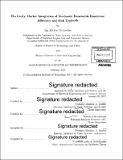Electricity market integration of stochastic renewable resources : efficiency and risk tradeoffs
Author(s)
Schneider, Ian Michael
DownloadFull printable version (5.988Mb)
Other Contributors
Massachusetts Institute of Technology. Department of Electrical Engineering and Computer Science.
Advisor
Mardavij Roozbehani and Munther A. Dahleh.
Terms of use
Metadata
Show full item recordAbstract
Electricity generation from renewable sources is growing rapidly, but the variability and uncertainty of renewable resources like wind and solar energy can increase the costs of supplying reliable electricity. Competitive markets for wholesale electricity are widely used in the United States, but the regulatory details that govern their treatment of stochastic resources can have significant effects on efficiency and risk. This research analyzes how producers respond to market mechanisms intended to improve forecasting and long-term siting decisions. This thesis characterizes producer equilibrium strategies in competitive short term energy markets by examining the bidding behavior of energy market participants when energy imbalance payments are determined endogenously from market clearing conditions. The results show that the market-based pricing mechanism leads to better tradeoffs of system efficiency and risk compared to the case where penalties are exogenous, suggesting additional benefits of market-based penalty prices beyond those previously studied. This research also explores how long-term market investment equilibria are affected by current energy policies. It presents new analytical results showing how the Production Tax Credit (PTC) biases wind investment towards high-producing sites, but with higher overall levels of wind correlation, which can induce additional costs associated with reliability and system risk.
Description
Thesis: S.M. in Technology and Policy, Massachusetts Institute of Technology, School of Engineering, Institute for Data, Systems, and Society, Technology and Policy Program, 2017. Thesis: S.M. in Electrical Engineering, Massachusetts Institute of Technology, Department of Electrical Engineering and Computer Science, 2017. Cataloged from PDF version of thesis. Includes bibliographical references (pages 55-57).
Date issued
2017Department
Massachusetts Institute of Technology. Department of Electrical Engineering and Computer Science; Massachusetts Institute of Technology. Engineering Systems Division; Massachusetts Institute of Technology. Institute for Data, Systems, and Society; Technology and Policy ProgramPublisher
Massachusetts Institute of Technology
Keywords
Institute for Data, Systems, and Society., Technology and Policy Program., Electrical Engineering and Computer Science.